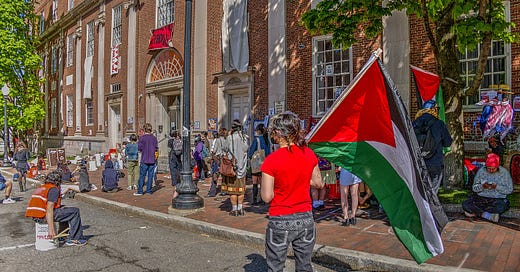Silence, Surveillance and the Failure of American Universities
What I learned from writing about pro-Palestine campus protests.
Earlier this week, I published a story in Prism on the surveillance of pro-Palestine protesters at universities across the country. Many of the issues I raise in the piece are cause for concern; Schools possess social media surveillance technology, advertised for chilling protests. They are tracked by CCTV, and, in two instances, students had their homes raided by campus and local police. In my opinion, however, the most concerning part is how much we still don’t know about what schools are doing to crack down on dissent.
In my research for the piece, I found a report from the Homeland Security Academic Partnership Council on managing campus protests about Israel and Palestine. As the council’s name suggests, its purpose is to foster collaboration between school administrators and the Department of Homeland Security. The report read like an extension of this mission, highlighting how universities could share information and resources with the government. Recommendations included working with fusion centers, controversial intelligence hubs with anti-Muslim history, and allowing university police to access databases of sensitive but unclassified information. Naturally, when I asked DHS and HSAPC members about this (many times, might I add), I got no response. I still can’t say for sure what recommendations were followed through.
I understand the need for a degree of secrecy in law enforcement, but I also believe now more than ever that students should broadly know if and how their school is working with Homeland Security. Between the time I pitched this story and its publication, Trump took office and appointed Border Patrol Barbie Kristi Noem to helm the department. Trump also signed an executive order calling for revoking the visas of pro-Palestine student protesters and rolled back protections that would prevent Immigration and Customs Enforcement from entering college campuses. Secure Community Network, a private Jewish security firm who I mentioned in my piece and is repeatedly identified in HSAPC’s report as a resource to combat antisemitism, encouraged Trump to deport protestors in a letter sent shortly before his inauguration.
While ICE still can’t enter private spaces, like dorms, without a judicial warrant, Inside Higher Ed reports that distrust of the Trump administration and lukewarm responses of university officials increased anxiety among students. Uncovering the DHS-university connection, it turns out, isn’t just a problem for journalists like myself. In early February, University of Arizona College Democrats contacted university officials, with the hope of clarifying whether the school would share student information with law enforcement agencies. A couple of weeks later, the student newspaper said faculty and staff “haven’t heard anything” from the administration.
As I point out in the piece, we know from examples like Yale and Ohio State that universities and DHS do have a relationship; the question is how far that relationship goes. Reticence is understandable when it comes from the desire to protect an individual’s information or sanctity of an investigation. But in this political climate where an institution’s actions can be the difference between completing your education or being deported, silence and confusion are tools of psychological violence.
All of this campus militarization plays out against the backdrop of the GOP crusade for institutional neutrality, the idea that schools should not comment on political issues at risk revealing the bias. Now, the shallowness of this philosophy couldn’t be more clear as schools are faced with the question of whether to cooperate with a politicized branch of the federal government that actively seeks to harm its community. Universities are not only inherently political, but also ideologically capturable. The compulsion to be silent and keep out of controversy is no good faith effort at campus safety but a means to conceal the extent of conservative ideological creep and the allure of cozying up to state power.
Photo credit: Kenneth C. Zirkel via WikiMedia Commons





